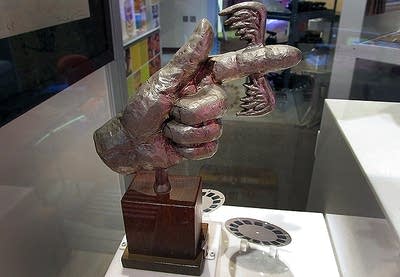'The 1968 Exhibit' recreates tumultuous times, from Tet to Nixon

January 1968 ushered in a tumultuous year in American history, one in which the Tet Offensive began in Vietnam, Johnny Cash performed at Folsom Prison, the Beatles released "The White Album," Martin Luther King, Jr. and Robert Kennedy were assassinated and Richard Nixon was elected president.
Society felt like it was turned upside down, and the upheaval is all captured in "The 1968 Exhbit" opening Friday, Oct. 14 at the Minnesota History Center.
MPR got a sneak peak at the exhibit before it opened, hosted by curator, Brian Horrigan. Everything from Janis Joplin's pants to a police helmet worn by a Chicago policeman during the riots at the Democratic National Convention are on display, organized month-by-month.
"Vietnam was the central fact of American life in 1968," Horrigan said. "We wanted that fact to come out immediately." And it does, whether through the percussive sound of military helicopter blades echoing around the exhibit, or in the protest music, or news footage from the era. And an American living room containing a reconstructed Vietnam era helicopter is the first thing a visitor sees.
Create a More Connected Minnesota
MPR News is your trusted resource for the news you need. With your support, MPR News brings accessible, courageous journalism and authentic conversation to everyone - free of paywalls and barriers. Your gift makes a difference.
But there was more to the year than that. Consider just some of the moments from 1968:
January: The Tet Offensive marks a violent and crucial turn in the Vietnam War. The children's TV show. "Rowan and Martin's Laugh In" debuts on NBC, complete with actress Goldie Hawn dancing in body paint and "The Flying Fickle Finger of Fate Award."
February: Saying that, "Our nation is moving toward two societies, one black, one white, separate and unequal," Martin Luther King Jr. responds to the release of the report of the Kerner Commission, on the causes of the racial violence that erupted in the summer of 1967. CBS newsman Walter Cronkite reports from Vietnam, and says that war will likely end in a stalemate.
March: Declaring, "These are not ordinary times, and this is not an ordinary election," Robert F. Kennedy enters the presidential race. In Vietnam, U.S. soldiers massacre more than 500 Vietnamese civilians in the village of My Lai, and President Lyndon Johnson announces he will not run for re-election.
April: Martin Luther King Jr. is assassinated on April 4 in Memphis; the Civil Rights Act is signed a week later on April 11. The Pentagon calls up 24,500 military reservists, and announces a new troop ceiling of almost 500,000 U.S. soldiers in Vietnam. "Hair" opens on Broadway, and Vice President Hubert Humphrey, of MInnesota, enters the presidential race.
May: FBI director J. Edgar Hoover launches "Counterintelligence Program/New Left," or COINTELPRO, which secretly infiltrated, discredited, and disrupted domestic political organizations. The Beatles launch their own record label: Apple.
June: Robert F. Kennedy is assassinated while campaigning for the presidency. James Earl Ray is arrested on suspicion of murdering Martin Luther King, Jr. Pediatrician and author Dr. Benjamin Spock and Yale University Chaplain William Sloane Coffin, Jr., are convicted of conspiring to help young people dodge the military draft.
July: "The Green Berets," an unabashed pro-military movie starring John Wayne, is released. The Doors release "Waiting for the Sun." Saddam Hussein takes power in Iraq. Members of Minneapolis's Native American community establish the American Indian Movement, or AIM, attracting members from across the United States and Canada.
August: California Gov. Ronald Reagan announces his first candidacy for president; he would finally succeed in his quest for the White House in 1980. Richard Nixon won the Republican nomination in 1968. Vice President Hubert Humphrey, of Minnesota, wins the Democratic nomination in Chicago, as riots break out in the streets outside the convention hall.
September: Beat poet Jack Kerouac debates conservative icon William F. Buckley on the TV show "Firing Line." Feminists crown a sheep "Miss America" and throw their bras and girdles into a "Freedom Trash Can" during the Miss America Pageant in Atlantic City, N.J. Arthur Ashe becomes the first African-American man to win the U.S. Open tennis championship.
October: American sprinters Tommie Smith and John Carlos give a black power salute during the medals ceremony in the 200-meter sprint at the Olympic Games in Mexico City. Jane Fonda becomes a cultural icon for her starring role in the science fiction movie "Barbarella." Jimi Hendrix releases "Electric Ladyland."
November: Richard Nixon is elected president of the United States. The Beatles release the White" album. University of Southern California running back O.J. Simpson wins the Heisman Trophy. Cream, featuring Eric Clapton, Ginger Baker and Jack Bruce, play a concert at London's Royal Albert Hall before disbanding.
December: Author and LSD fan Timothy Leary is arrested on drug possession charges. The Apollo 8 U.S. spacecraft orbits the moon. Elvis Presley, decked out in leather pants and jacket, stars in a "Comeback TV Special." Stanford University researchers introduce the world's first word processing computer.
Horrigan said he wants visitors to leave "The 1968 Exhbit" with a better understanding of how social conflict in America today, whether embodied in the tea party, religious fundamentalists or Wall Street protesters, is nothing new.
"I would like them to understand that this sense of conflict and division that we think now is so extreme has precedents, that there was a time when America seemed to be coming apart at the seams," he said. "The polarized society that we feel so strongly now has roots in the 1960s."


